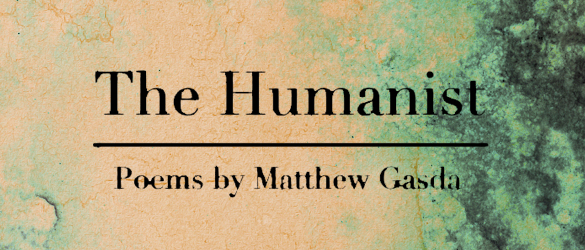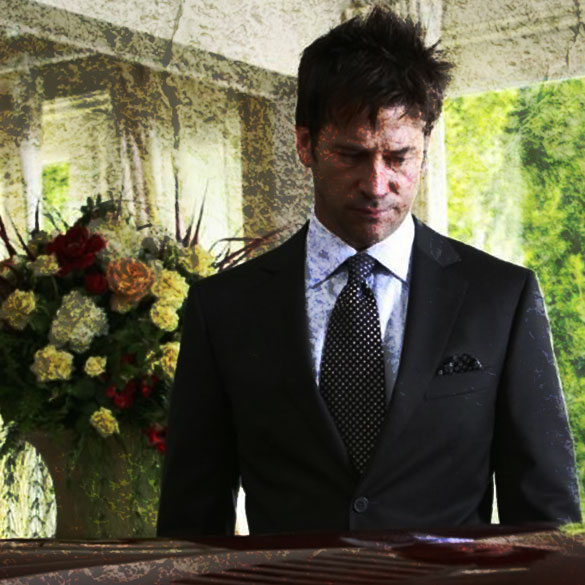“As if magic were not the impossible
but the potential in each one of us
to imagine and make as dreamers make
from the universal stuff
of love and death…”
So writes Matthew Gasda in his search for imagination in the world, a chapbook of poetry entitled The Humanist. Gasda’s poetry looks for the beauty and love in the world, in the everyday things we have around us, in the simple moments of lying in a garden or walking the aisles in a supermarket. The Humanist, released only a few weeks ago, is Gasda’s first published chapbook of poetry.
Gasda’s work takes on the age old themes of poetry: happiness, memory, life, death, and love. A conversation in the aisle of a supermarket transforms into introspection about what death means to an individual. He takes inspiration from the likes of Shakespeare, Wagner, and Bernini to name a few, and turns out a few very nice insights throughout the book. From his introduction: “The Philosopher believes he can uncover the ground of being through reason. The poet rejects reason and insists that being must be shown.” Another bit of philosophy from the poem “Puncture”:
“Happiness is not a transformation
of the object but the subject”
Many of the poems share images and inspiration. Art, painting, light, sound, and nature are some of Gasda’a favorite themes to draw on. Painting is a topic of the first three poems in the collection, and the name Rilke appears in at least three poems. Nature, like for so many poets before him, plays a large role in Gasda’s poems. He takes a microscope eye to the minute details of the natural world and then magnifies the beauty of a single moment. The poem “Still Life with Anemones” begins with four anemones in a jar, grows outward into a conversation of art and form, and then back inward again to the space the anemones inhabit. Another example comes from “Summer Monological I” which also takes a keen look at nature’s minute details:
“The intricacies of a hummingbird’s wings are
extraordinarily clear if you close your eyes
and let the folds of existence pack themselves
together and condense into something crystalline.”
Some of the most beautiful poems in this chapbook are also the shortest. “The Painter” and “The Painter II” are beautiful examples of Gasda’s ability to lightly dot words on the page, playing with space and position, to create a fresh, crisp feel from the poem. “Disclosure” is also wonderful in its simplicity. The shorter poems work well interspersed with the longer works of the chapbook; they add variety of depth and give the reader a little breathing time. The endings of the poems are also especially beautiful. Light and delicate and wonderfully different from some of the wordiness that populates the central bulk of most of the poems. They catch you off guard or bring you full circle back to the opening lines, to a question or dilemma posed at the beginning of the poem and closed off at the end.
But Gasda occasionally gets long-winded. There are moments when he seems to be writing one very long run-on sentence broken up to look like verse, or simply going in circles. From his introduction: “The poet deepens his life-world by deepening his facility with words and the words themselves deepen with the gradual deepening of the life-world.” The two poems that are most guilty of this are “The Philosopher” and “Puncture,” both standing at close to six pages and both feeling more like an exercise in circular thought than verse. That is to say that sometimes Gasda gets a bit bogged down in the philosophy he wants to present and doesn’t quite do enough showing in his poetry.
The weakest part of The Humanist is the introduction. Gasda’s opening words – “Poetry must begin with the crisis of the imagination struggling to overcome death and annihilation. Poetry which assumes a different subject risks flippancy and irrelevance.” It’s heavy and overreaching, but not quite so heavy and overreaching as when he later says, “The poet is always making himself universal, is always universalizing his own experience by daring to write.” No doubt all poets believe their poetry to be universally important and encompass all humanity on some level, but rather than listening to a wordy expose on what the poet thinks his poems are, I simply want to experience them for myself.
The Humanist is Gasda’s first book of poetry. His poems have appeared in Leveler Poetry, Gadfly Online, and The Four Cornered Universe. He currently resides in Brooklyn. The Humanist is available for purchase from Amazon.com.


